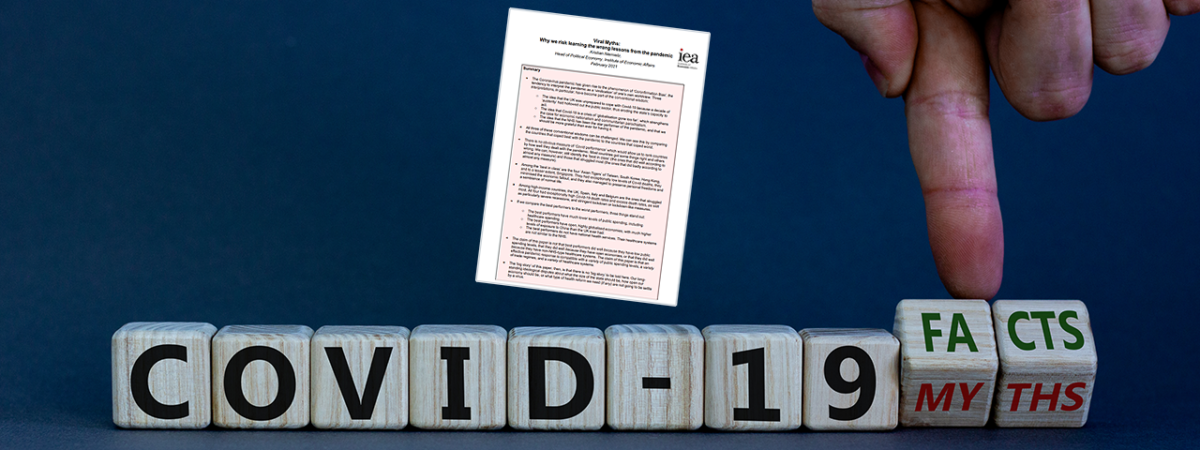The pros and (mostly) cons of an online sales tax
SUGGESTED



In general, economists quite like taxes on expenditure, such as sales taxes and VAT. These taxes can be less distortionary and harder to avoid than taxes on wealth, personal income or corporate profits, and thus be a more efficient way to raise a given amount of revenue.
Depending on the goods and services to which they are applied, expenditure taxes can also be “progressive”, meaning that they take a smaller percentage of the income of lower-income households (or at least a smaller percentage of the amount that they spend).
There are precedents too. When the Treasury wanted to reduce public borrowing in 2010, the standard rate of VAT was hiked from 17.5% to 20%, while keeping the lower or zero rates on essentials like domestic energy supplies, food and children’s clothing. A further increase is presumably ruled out today, given the 2019 manifesto commitment not to raise VAT, income tax or NICs. But if the government did need to raise more revenue now (a big if), an online sales tax could serve a similar purpose.
An online sales tax could also be seen as a logical extension of the existing Digital Services Tax (DST). This is a new 2% tax on the revenues of search engines, social media services and online marketplaces, though it is complicated and is expected to raise only a few hundred million pounds a year.
Nonetheless, the thinking behind the current proposals still seems fundamentally flawed. For a start, it is plain wrong to assume that online retailers are making unreasonable profits, even during the pandemic. Amazon and Ocado are good examples.
One of the laziest things you can do is compare the value of sales that take place on Amazon’s site with the relatively small amount that the company itself has paid in corporation tax, and then conclude that the firm must be paying less than its fair share. This misunderstands both the company’s business model and how corporation tax actually works (it is of course paid on profits, not turnover).
Amazon does sell some products on its own behalf (on which, by the way, the DST is not payable, because this is Amazon acting as a retailer rather than an online marketplace). But it operates mainly as a platform for other businesses, which are therefore the ones making the bulk of any profits (and paying the DST).
Amazon’s own margins (globally, not just those booked in the UK) are low, ranging between 0% and 4% historically and perhaps still only 5% or so last year. In addition, Amazon, like other digital companies, has presumably reduced its corporate tax bill by legitimate use of government incentives, such as investment and R&D allowances.
The story for Ocado is similar. Despite a surge in sales, the company has just reported a pre-tax loss of £44 million in the 52 weeks to November. This was at least an improvement on the £215 million loss in the previous year. But it shows that being a thriving internet business is no guarantee of decent profits.
Contrast this with the toxic language being used by some advocates of an online sales tax. Companies that increased sales during the crisis are often described as “cashing in”, even though they are simply responding to consumer demand, are facing much higher costs, and have had to invest heavily. Would we rather that they didn’t bother?
The idea that the new taxes would only hit “online giants” is nonsense, too. It can’t be stressed often enough that companies are only legal entities and cannot bear the economic burden of tax increases themselves. Instead, all taxes are ultimately paid by real people.
This will include shareholders, very few of whom will be as rich as Jeff Bezos. But the burden will also land on employees, in the form of lower wages, and above all on consumers, as higher prices.
Of course, the government might argue that people should pay more to shop online, in order to redirect business back to the high street. Indeed, the Sunday Times reported a “close ally” of the Chancellor as saying that “he does accept that the way we tax online sales at the moment is killing the high street and something needs to be done on it”.
This argument is very weak. At the risk of stating the blindingly obvious, the main reason why the high street is struggling at the moment is that most non-essential shops can’t open because of the pandemic. For many, selling online is actually a lifeline.
Even once the Covid restrictions are lifted, an additional tax on online shopping could only be justified if there is some wider public interest in subsidising high-street retail, or some hard evidence that digital companies are currently under-taxed in some systematic way. I’ve yet to see any.
In reality, there are many good reasons why people might continue to prefer to shop online, including greater choice and convenience. Price is obviously a factor as well, but lower prices are generally considered to be a “good thing”.
There are also sound economic reasons why digital businesses might have lower costs and pay lower taxes, including business rates; for example, they may be able to operate from more efficient out-of-town warehouses, rather than occupy prime city-centre properties.
One of the daftest ideas I’ve read is therefore that high street firms which also sell online (i.e. most of them) will be allowed to offset their business rates against the online sales tax. This would further complicate the tax system, reduce any increase in overall revenues, and distort the playing field in favour of businesses which operate from more expensive properties. Why would the government want to do this? (If the problem is business rates, then reform business rates, rather than attempt to correct one bad tax by introducing another.)
The argument that we need to protect jobs on the high street doesn’t stack up either. The purpose of economic policy shouldn’t be to employ people in particular types of activity. But as it happens, digital businesses employ people too. It makes no more sense to argue that consumers should pay extra to shop online than it does to say that people should be encouraged to waste hours commuting to work in order to buy an over-priced sandwich for lunch.
Nor is it good enough to point to polling evidence that an online sales tax would be popular, or that it’s backed by some high-street retailers (who have an obvious vested interest), or that people think online retailers don’t pay their fair share of tax. Responsible politicians (and serious journalists) should try to correct any misconceptions, rather than encourage them.
I wonder how the polling would look if it were first explained that an online sales tax would mean higher prices, including for food and clothing (which are largely exempt from VAT), or that many of the “online giants” are actually losing money.
I’m also not sure that an online sales tax would raise much more money than the DST. Some have suggested a starting figure of 1% which, even if applied to most online retail sales, might not raise much more than £1 billion a year, compared to the £31 billion from business rates and £134 billion from VAT (in 2019-20). (Total retail sales, excluding fuel, are about £400 billion a year, of which around 25% might remain online after Covid.) That’s a lot of hassle for not a lot of revenue, and a 1% tax probably won’t be large enough to change consumer behaviour anyway.
The idea of an “excess profits tax” is at least as bad. Companies that have made more profits during the pandemic will already pay more in tax. Charging an arbitrary and retrospective windfall tax on top would send a terrible signal to anyone thinking of growing a business in the UK
The good news is that neither an online sales tax nor an “excess profits tax” are likely to be ready in time for the next Budget on 3 March. The Treasury and Downing Street Policy Unit still seem determined to work on these ideas as options for the future. But hopefully it should soon become clear that a strong economic recovery will remove the need for tax rises of any kind – let alone new taxes targeting one part of the economy that has served us relatively well.
In summary, a new online sales tax could help to fill the hole in the public finances in a relatively fair and efficient way. However, there is no obvious public interest in taxing online spending more than spending on the high street. There is also little evidence that the “online giants” are making unreasonable profits, or that digital businesses are systematically under-taxed. To cap it all, an online sales tax may not even raise a large amount of money.
This article was originally published on Julian Jessop’s blog.




